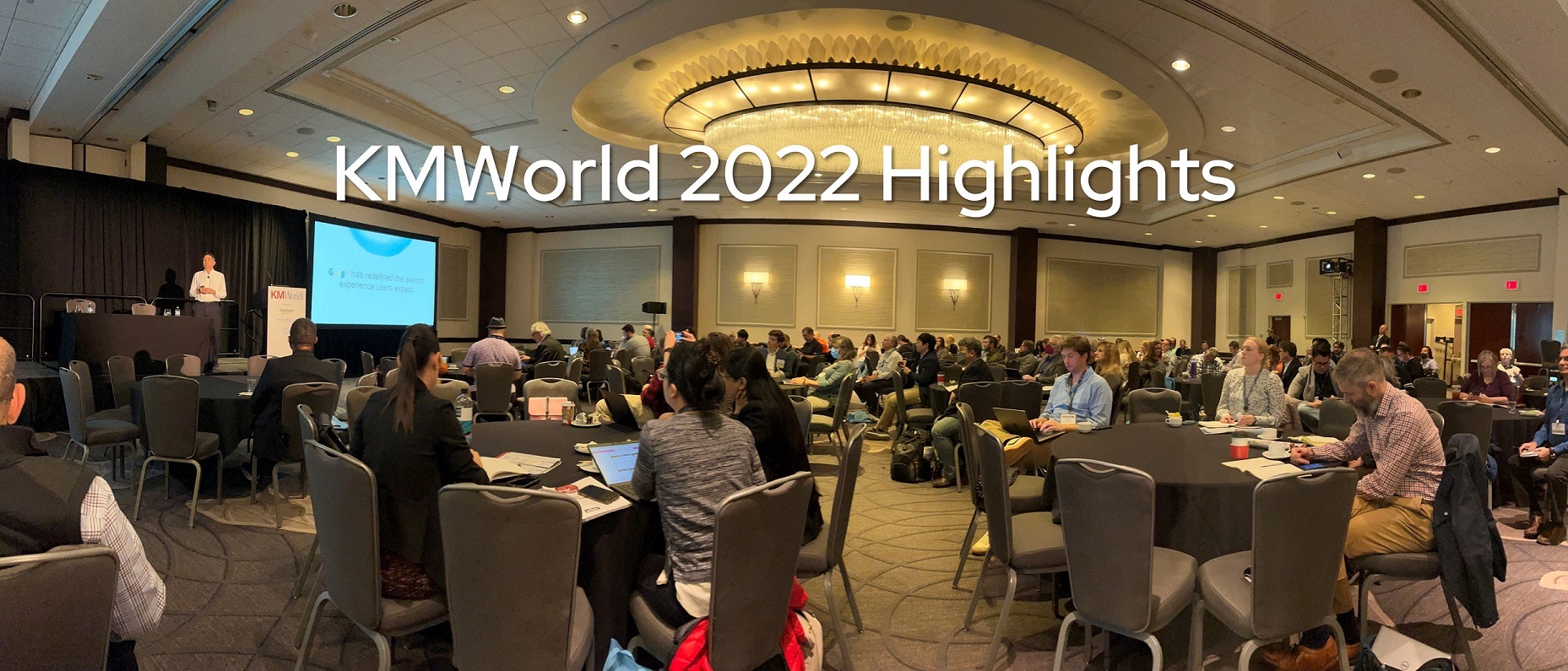



Graham Gillen
The following are highlights from last week’s KMWorld 2022 global conference, where Pureinsights was a Platinum sponsor.
Return to Normal – Almost
We’ve been going to the KMWorld conference – as one company or another – for over ten years. The global conference returned to a “live” event format this year after a two-year hiatus (the conference was virtual during the peak of the COVID pandemic).
Was it a return to a post-pandemic “normal”? Almost.
- We estimate that attendance was about 400-500 people, not including vendors, which is about 80% of its past “peak” attendance.
- The conference featured KM-centric keynotes as well as the usual three tracks, including Taxonomy Boot Camp, Text Analytics Forum, and Enterprise Search & Discovery.
- Attendee energy was palpable, with pent-up demand for in-person networking and learning opportunities. And, thankfully, everyone was respectful of whether you were masked or not.
Healthy Vendor Support
Among the many KMWorld 2022 highlights and pleasant surprises was the healthy level of vendor support in the form of a full, sold-out exhibit hall. We counted over 40 vendors in the consulting, technology, education, and services space – including a lot of names in the search space that were “new” to attendees, Pureinsights included.
- Mainstream companies – Microsoft (Viva), Amazon (Kendra)
- Traditional search vendors – Sinequa, Coveo, Searchblox, Hawksearch, Lucidworks
- New names – Pureinsights, Yext, Squirro, Glean, Unleash
So what’s “new” in search? Most vendors are talking about AI-powered search or natural language processing in one form or another. While this creates some buzz in the industry, it’s also apparent that the role and usefulness of AI is not yet well understood in the KM space. To some, it just represents another level of complexity to already hard-to-solve problems in knowledge management and information retrieval.
This led to an interesting conversation we had with a Gartner analyst in attendance. We explained that our SearchOps™ full managed service for search applications was getting some traction, and the analyst said that he was being asked by many of his clients about just that. It’s hard enough to find search experts or developers who understand search. It’s even harder to add experts to incorporate knowledge graphs, and now, advanced AI and NLP. We look forward to a follow-up call with this analyst to discuss in greater detail. We think the market is ready for a Business Process Outsourcing model for search.
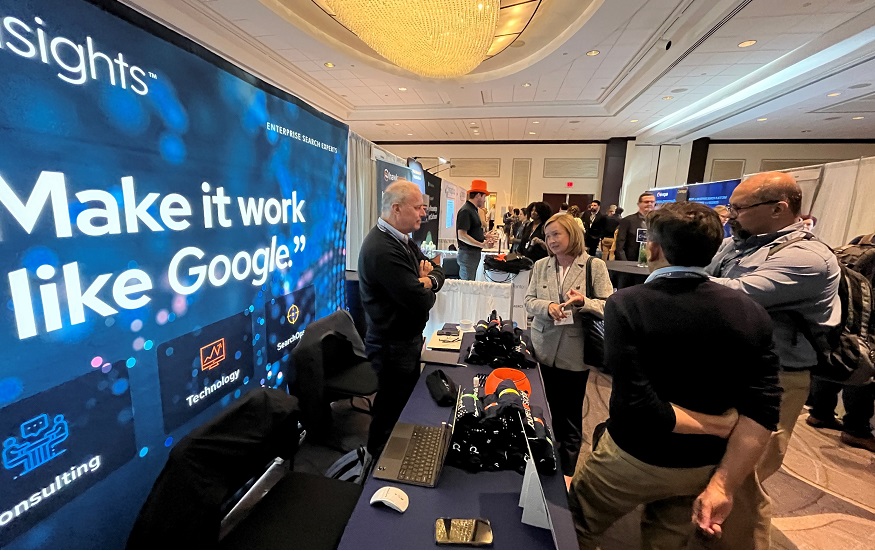

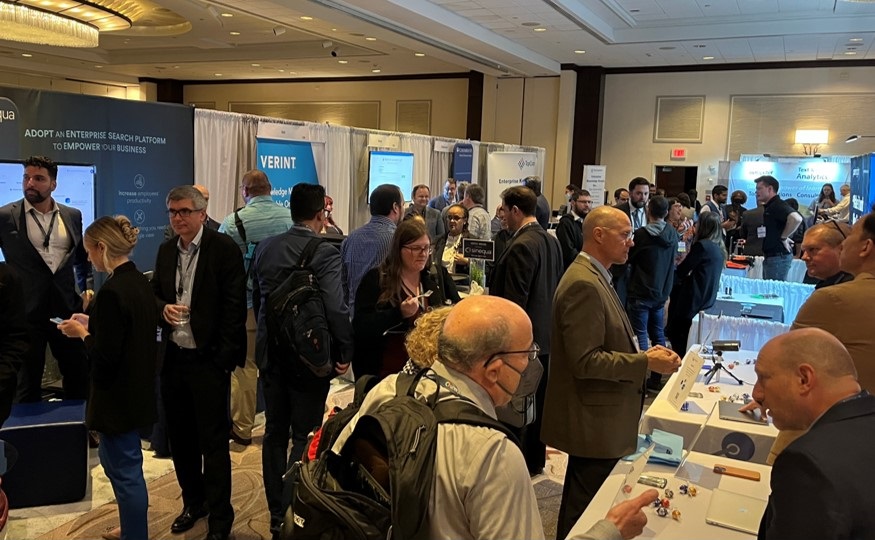

All About AI, Smarter Search, and Knowledge Management
For decades, Knowledge Management has been rooted in methodologies and tactics to try to organize information. These methodologies included the implementation of KM best practices as well as proscriptive advice to develop taxonomies and ontologies; the goal being, to try to put structure to the language and vocabulary necessary to turn information into consumable knowledge.
Traditional keyword-based search fit perfectly with this KM philosophy. Even knowledge graphs align well with traditional KM. AI, however, is a different animal.
Often, when you mention AI to a KM practitioner, or someone in the text analytics field, there are more questions raised than answers. “What do you mean by AI?” “What is AI anyway?”
The idea that you can apply something called machine learning to “train” an AI model to understand language seems foreign to traditional text analysts and NLP practitioners. Add to that the fact that developers might be able to create a working AI model like Google BERT, but not always be able to understand how or why it works is, to say the least, disconcerting to KM practitioners.
Pureinsights Presentations: Demystifying Google, AI and NLP
Which leads us to the goal behind Pureinsights’ presentations at KMWorld.
- First, a keynote by our CEO, Kamran Khan, entitled “Make it Work Like Google”
- Followed by a deeper dive into Google Featured Snippets (or Extractive Answers), presented by our Senior Architect, Ricardo León
- Finally, Kamran also participated in a panel discussion on the future roadmap of enterprise search and discovery on the last day of the conference
We provide you with the highlights of these presentations below, and we’ll provide links to the recordings if they become available in the future.
Keynote by Kamran Khan – “Make it Work like Google”
If you ever wondered what KM and Google have in common, we’ll remind you of Google’s Mission Statement:
“Google’s mission is to organize the world's information and make it universally accessible and useful... Search makes it easy to discover a broad range of information from a wide variety of sources.”
So besides the fact that Google sets the bar for what users expect from just about any search application, you also can’t ignore the fact that Google thinks AI – in some form – helps them fulfill their mission. And that’s why AI can’t be ignored or discounted as far as its potential impact on search and knowledge management.
Our CEO, Kamran Khan, addressed this very question in his keynote in front of the entire KMWorld audience. In his presentation, Kamran explained the Google search experience can now include traditional search results, direct answers from knowledge graphs, and featured snippets or answers “extracted” from text using advanced AI and natural language processing.
He further provided examples of these results, including demystifying “extractive answers” with an illustration of how it works using vector search (a very hot topic in search right now, also called neural search or semantic search). Following the presentation, several attendees told us it was the clearest explanation to them of how Google search works today on the internet, and that similar results certainly were achievable in their enterprise.
If you did not attend in person, you can watch a replay of Kamran’s KMWorld keynote.
Presentation by Senior Architect Ricardo León – “Extractive Answers and Intelligent Search”
In his presentation in the Enterprise Search & Discovery track, our Senior Architect, Ricard León did a deeper dive on “extractive answer” to complement our keynote.
Ricardo provided a more detailed explanation how NLP is, in fact, a branch of AI, and he gave a deeper explanation of the advance in language “understanding” provide by vector search (also called neural or semantic search), as contrasted to traditional text-analytics approaches.
The presentation was also well received, with many attendees commending Ricardo for the clarity and thoughtfulness of his presentation. We will share a recording of this presentation if available, but in the meantime, you can read the gist of the content in Ricardo’s recent blog post – Delivering Extractive Answers with AI and NLP and you can also download a PDF copy of the Extractive Answers presentation here.
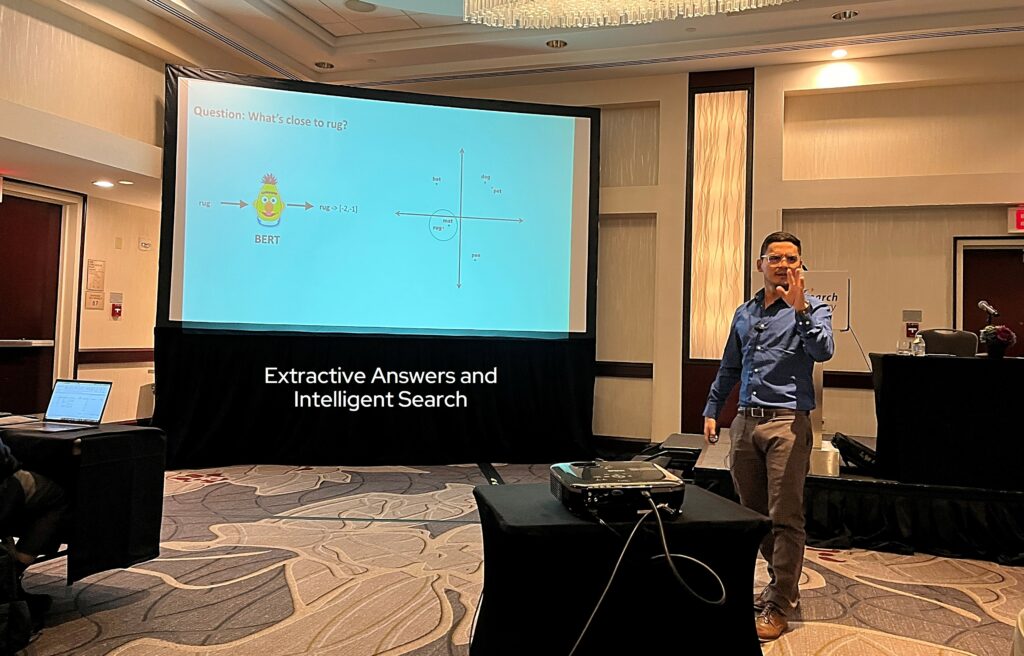

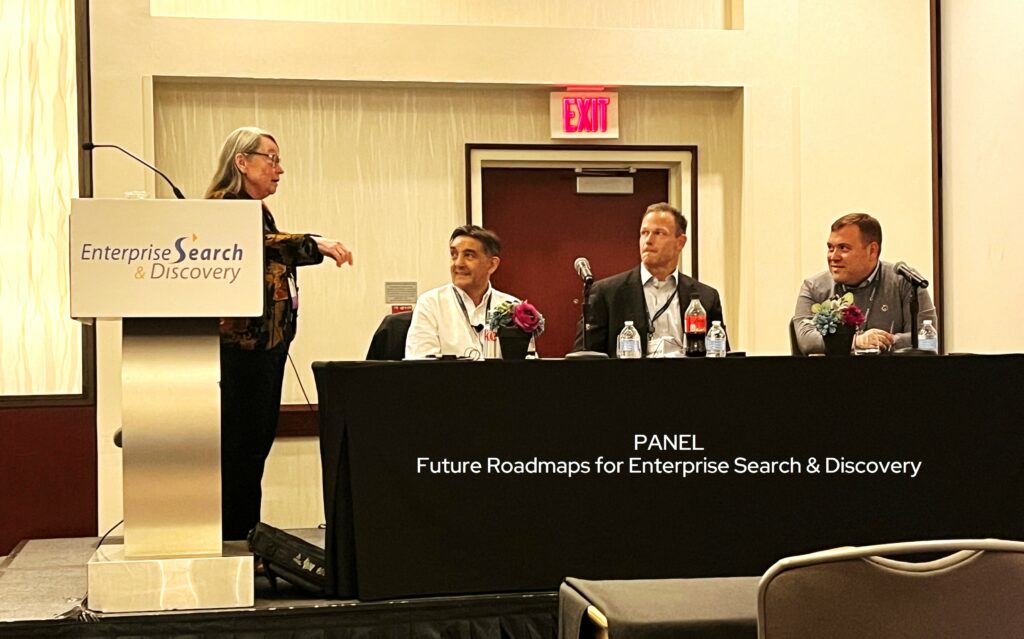

Panel – Roadmaps for Future Enterprise Search and Discovery (ES&D)
On the final day of the conference, our CEO Kamran Khan participated on a panel discussion entitled “Road Maps for Future Enterprise Search and Discovery”. Other panelists included Jeff Evernham, VP of Product Strategy at Sinequa, and Sean Coleman, VP of Revenue at Upland BA Insight. The panel was moderated by ES&D track chairman Marydee Ojala.
Not surprisingly, most of the questions – and responses – around the future of ES&D centered around where the industry is, and where it’s likely to be going with AI and advanced NLP. There were only subtle differences among the panelist as to how AI was going to impact the industry. Many of the minor differences centered on:
- The form factor or time frame for AI to take root in virtually all search applications
- Which industry use case would see the fastest adoption (ecommerce, customer support, etc.)
- The impact of and differences in commercial vs open-source solutions
But for the most part, they agreed
- That technologies like deep learning language models were here to stay,
- That the pace of change and innovation continues to be frantic, and
- That we have not yet seen the full impact of how that may evolve the knowledge search and consumption experience.
KMWorld 2022 Highlights – In Conclusion
Here is our TLDR summary of KMWorld 2022, viewed from the perspective of a search technology and services vendor:
- KMWorld is Back – attendees definitely appreciated the energy, learning, and networking opportunities afforded by a live (vs virtual) event.
- KM is Healthy Market – a sold out exhibit hall is a sign that the KM and search spaces continue to evolve, and that practitioners are cautiously embracing the change.
- AI is the Future, like it or not – there’s no denying that advanced KM, Search and NLP are being transformed by AI and machine learning.
- Fortune Favors the Bold – the challenge for practitioners and solution developers is to educate themselves with pragmatic information and not be afraid to explore what it means to deploy AI technologies.
One final editorial comment: while KMWorld and its sub-tracks were great, we think there is room for more industry events focused on search and search-based applications. Perhaps the mantle will be picked up by an organization like OpenSearch, and not left to shows that are organized and focused on one vendor. If you know of any, let us know!
In the meantime, we hope you enjoy the upcoming Thanksgiving holiday in the U.S. and we look forward to maybe seeing you in person at a live event in the near future.
Regards,
The Pureinsights Team